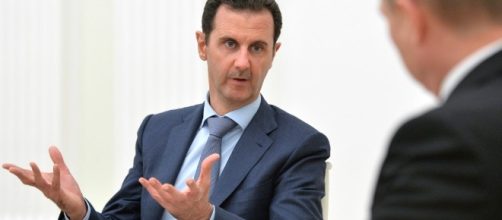In May the United States had released a report of finding a building that was "crematorium-like" near Saydnaya Military Prison. Stuart Jones, the acting assistant secretary of the State Department's Bureau of Near Eastern Affairs stated that although the atrocities committed by Bashar al-Assad regime are documented quite well, the building is possibly being used to hide more atrocities. It is suspected that up to 50 prisoners are being killed each day in that prison alone, and thousands have been hanged within the walls of the prison. But how can acts that resemble the Holocaust not be plastered on the news?
Why is it that there are few articles by mainstream news sources covering the atrocities with no follow-up?
Acts of Genocide
Much like the Holocaust, prisoners are being tortured, executed, and buried in mass graves, and now, incinerated in crematoriums. Executions carried out are to be "unconditionally supported by Russia and Iran", however, Jones added the US does not believe Russia or Iran are involved with the use of crematoriums. Declassified information had shown that the State Department had satellite photographs of a building that was seen to have no snow on the building in the winter, while the surrounding had. This has raised the question, Is this a crematorium? If so, can the Syrian conflict now be considered Genocide? Amnesty International reported that 20-50 prisoners a day, mostly opposition supporters, are secretly hanged at the facility.
This systematic killing must be genocide right?
Political opposition
As the Assad backed army gains territory and begins to overtake ISIS, the American-backed Syrian Democratic Forces (SDF) may soon clash with Assad's forces in the near future. Trump's focus seems to be on ISIS alone, and he has taken the offensive as he dropped one of the US' most powerful bombs in Afghanistan earlier this year. In the US, politicians have openly opposed Trump's plan to take the offensive on ISIS. However, ISIS would not have been a problem if the US had not funded it in it's earlier years. Is US intervention another detriment to society? History seems to repeat, and US intervention in forming governments and dismantling regimes seems to always fall through.
Look at the US' involvement in the Guatemala, the UN said we are to blame for a hefty amount of General Montt's sponsored killings, such as aiding in the training of military and torture of victims. Representative Tulsi Gabbard of Hawaii's 2nd District has been an advocate for non-interventionism and has condemned the attacks made by Trump on ISIS. Rep. Gabbard has also sponsored a bill to stop funding terrorists, which the US has been known to do to help take down other terrorist groups.
Other Democratic congressmen have been highly critical of Trump's decision to use military intervention, and now with the knowledge of Syria's use of crematoriums looming, will the political opposition begin to change as the urgency to end these atrocities becomes more severe?
Classification of Genocide
While genocide has been used more to classify mass and systematic extermination of peoples based on religious, ethnic, or racial groups, should political opponents be included? While Assad's regime is an off-shot of Shiites called Alawite, they are more focused on taking down anti-regime supporters and ISIS, as well as dealing with the Kurdish minority group accusing the regime of stripping them of their rights. Amnesty International has reported that along with the systematic killings of anti-regime supporters, Kurdish activists have been mistreated and arrested.
Polish lawyer, Raphael Lemkin, coined the word genocide in 1943. The UN in Nuremberg used the term genocide to sentence Nazis, however political opponents were not used in this term, which has made the classification of genocide a bit of a struggle.
The term has been developed to begin to fit atrocities that have happened since, and maybe it is now time to include political opposition. Syria's war has resulted in thousands fleeing and dying, and the classification of genocide will begin the healing process and ending of this long and drawn out war.


